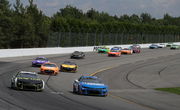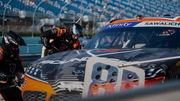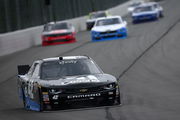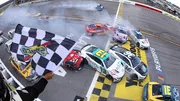
via Imago
Chase Elliott and Denny Hamlin | Image Credits: Imago

via Imago
Chase Elliott and Denny Hamlin | Image Credits: Imago
Remember when Chase Elliott deliberately spun out Denny Hamlin at Charlotte Motor Speedway in 2023? While the punishment back then wasn’t exactly severe, drivers pulling the same move today could find themselves in serious trouble. NASCAR’s new waiver policy changes the game—making it to the playoffs will now take more than just skills behind the wheel.
These updates send a clear message: intentional retaliation will come at a steep price, potentially jeopardizing a driver’s entire season. Denny Hamlin breaks it all down in a recent episode of Actions Detrimental, offering his take on how the policy shake-up could reshape the competition dynamics.
ADVERTISEMENT
Article continues below this ad
The suspension might not be just for one race anymore
During the Coca-Cola 600 at Charlotte Motor Speedway, tensions had flared between Denny Hamlin and Chase Elliott on Lap 186. Racing hard side-by-side, Hamlin squeezed Elliott against the wall in Turn 4. This led Elliott to retaliate by turning left. It had sent Hamlin’s No. 11 Toyota headfirst into the wall. Both drivers were taken out of the race, with Hamlin’s car totaled and Elliott’s No. 9 Chevrolet deemed beyond repair. NASCAR had declared Elliott’s move as intentional and handed him a suspension for just one race – Enjoy Illinois 300.
Speaking of how the decision was criticized, Hamlin added, “Because I think the argument was that, hey, it’s just a vacation at that point, you know? Chase Elliott, trust me, wanted to be at the next race. It was the middle of summer, but he got a week’s vacation, right? He didn’t get to race. And he really didn’t lose anything other than how many points he would have accumulated the next week.” With the updated guidelines, this wouldn’t be the case anymore. Missing a race for any reason other than a medical emergency means a driver forfeits all current and future playoff points. Not only will the driver miss the races and the chances of accumulating points, but he will also lose all the playoff points that he has accumulated till that race.
In the past, drivers like Bubba Wallace and Matt Kenseth have faced suspensions for aggressive payback moves. However, the penalty never extended beyond missing a race. Now, with the new points system in place, NASCAR has raised the stakes. This could serve as a major blow and would challenge the driver’s entry into the playoffs. The waiver policy will cover only medical emergencies for the driver, the birth of a child, or a family emergency.
The discussion further pointed out, “If you choose to race in another—let’s just sum it up—if you choose to race in another series or whatever or miss for a reason not listed, then you will lose your—you will forfeit your playoff points that you’ve earned up until that point.”
Last season, Kyle Larson found himself in a similar scenario. When he attempted to compete in both the Indianapolis 500 and the Coca-Cola 600. A rain delay in Indy caused him to miss the start of the Charlotte race. NASCAR wavered for an extended period before ultimately granting him a waiver. However, if a driver repeats the same action this season, NASCAR will forfeit all his points and deny any waiver. It is quite clear from the changes that the focus is now on a cleaner race, or else drivers will have to face consequences.
ADVERTISEMENT
Article continues below this ad
Trending
What’s your perspective on:
Does the OEP policy undermine NASCAR's merit-based system by favoring star power over skill?
Have an interesting take?
Hamlin expresses his take on the OEP policy
It is not new in NASCAR to witness rules and policies that do not make much sense. One such recent development has been the OEP or the open exemption provisional. To attract world-class drivers, NASCAR has now mentioned that drivers from outside the sport will get a secured starting spot. The spot is guaranteed even if the driver is unable to make it on speed during the qualifiers.
While NASCAR believes that this can improve the star power and appeal of the sport, Denny Hamlin does not agree. Sharing his take on the same, he said, “Yeah, I don’t necessarily think that if someone can’t make it on speed… You should definitely have to earn your way in, especially when you’ve got some multi-time champions of our sport not being locked in. But someone with a resume from somewhere else has an opportunity to lock in? I’m not really sure that’s fair.”
ADVERTISEMENT
Article continues below this ad
Hamlin’s concerns resonate with several other NASCAR drivers who believe that the OEP policy undermines the merit-based qualification system. As debates continue, many in the racing community question whether star power should outweigh fair competition.
ADVERTISEMENT
ADVERTISEMENT
ADVERTISEMENT
ADVERTISEMENT







Does the OEP policy undermine NASCAR's merit-based system by favoring star power over skill?